Business Ethics and Governance: The Enron Scandal and SOX Act, 2002
VerifiedAdded on 2023/01/06
|6
|1733
|98
Report
AI Summary
This report delves into the Enron Corporation scandal, examining its ethical and legal ramifications. It explores the failures in ethical corporate governance that led to the scandal, including the manipulation of financial statements and the misuse of employee pension funds. The report analyzes the role of the Sarbanes-Oxley Act of 2002 in addressing corporate fraud and enhancing accountability. It discusses how the Act aimed to prevent future misconduct by establishing the Public Company Accounting Oversight Board and imposing stricter regulations on corporate lending, whistle-blower protection, and CEO liability. The analysis highlights the violations of ethical principles and legal requirements by Enron's management, auditors, and accountants. The report emphasizes the importance of ethical conduct and compliance with regulations to maintain stakeholder trust and prevent financial crises, concluding that Enron's actions were a clear violation of both ethical corporate governance and the Sarbanes-Oxley Act, leading to severe consequences for the company and its stakeholders.
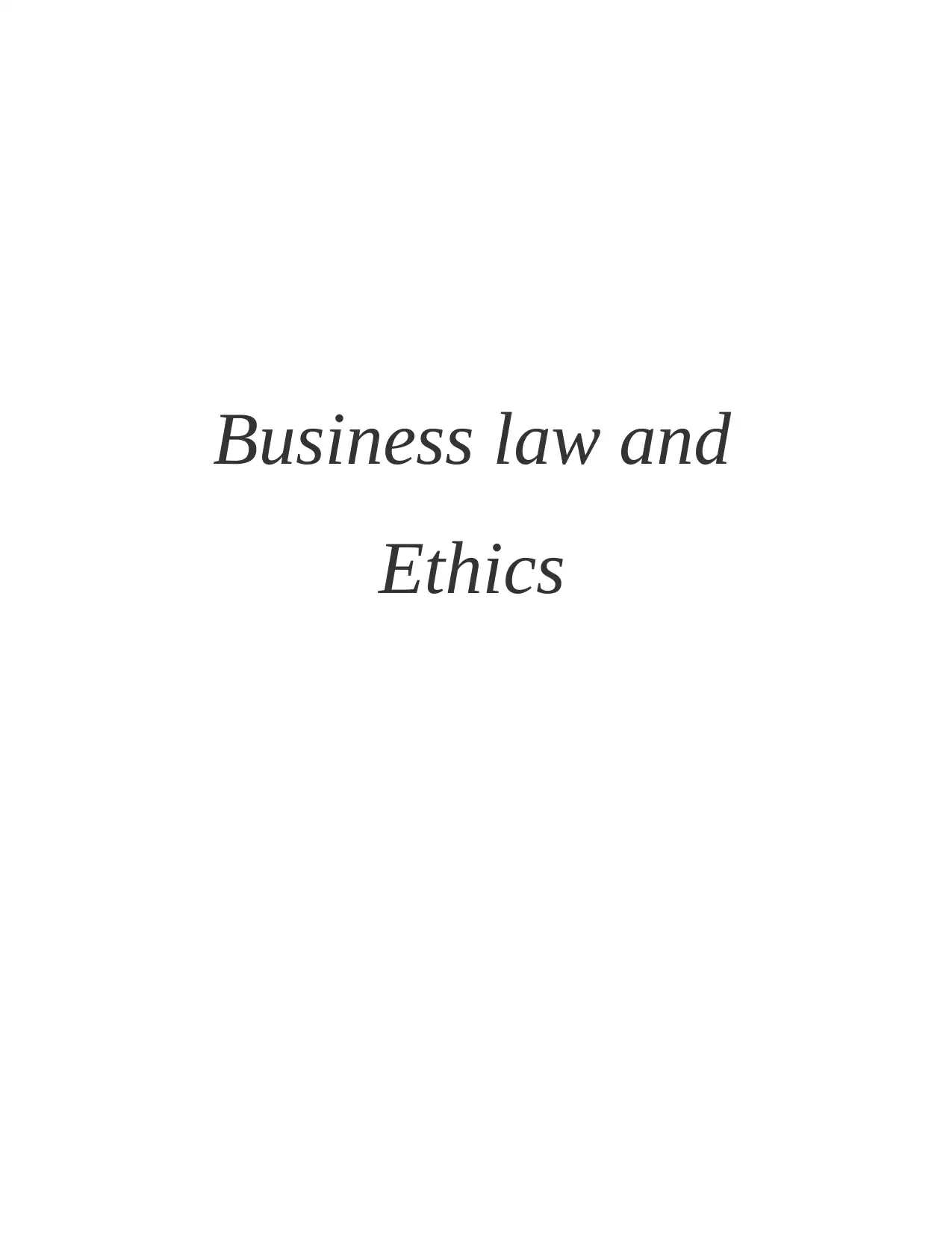
Business law and
Ethics
Ethics
Paraphrase This Document
Need a fresh take? Get an instant paraphrase of this document with our AI Paraphraser
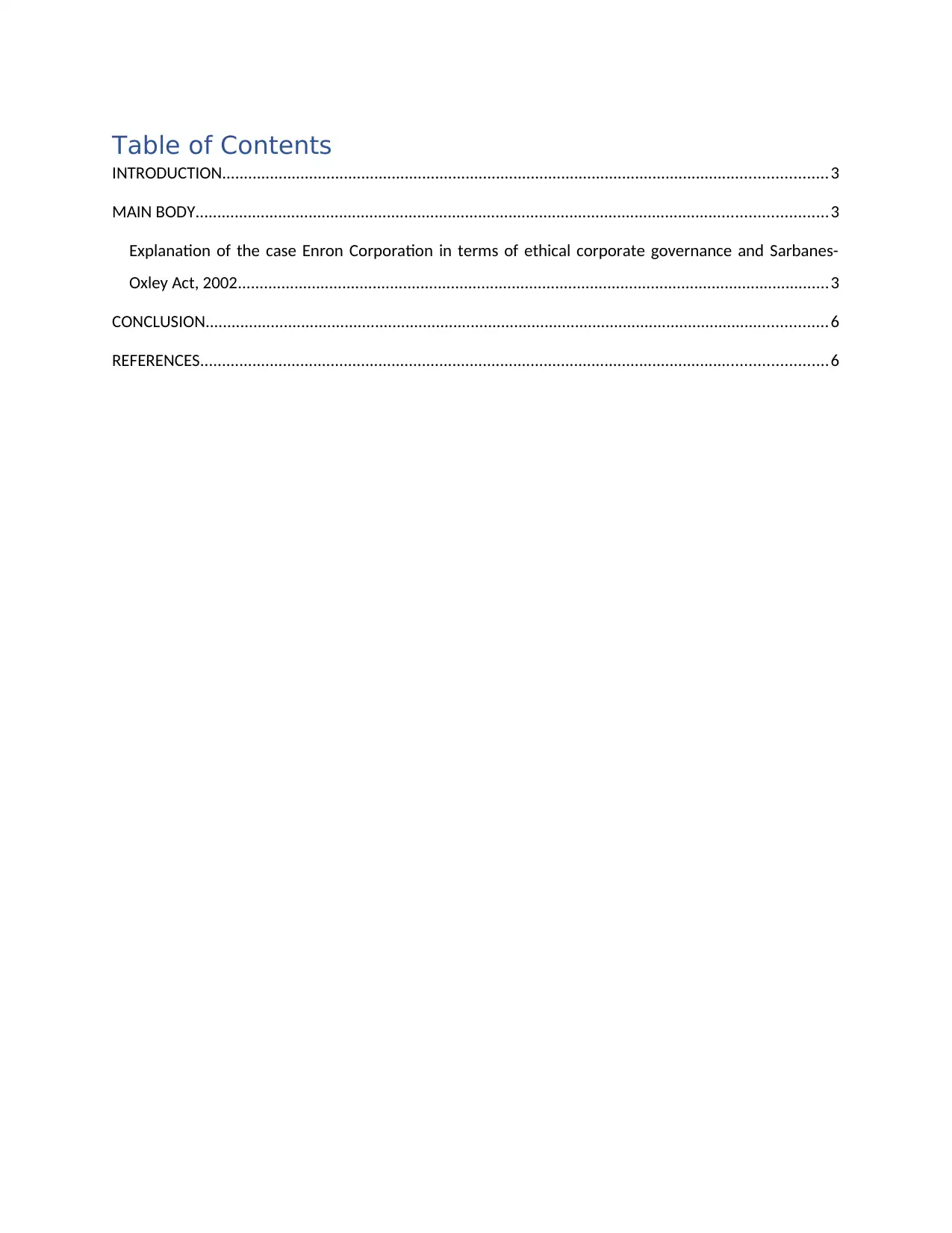
Table of Contents
INTRODUCTION...........................................................................................................................................3
MAIN BODY.................................................................................................................................................3
Explanation of the case Enron Corporation in terms of ethical corporate governance and Sarbanes-
Oxley Act, 2002........................................................................................................................................3
CONCLUSION...............................................................................................................................................6
REFERENCES................................................................................................................................................6
INTRODUCTION...........................................................................................................................................3
MAIN BODY.................................................................................................................................................3
Explanation of the case Enron Corporation in terms of ethical corporate governance and Sarbanes-
Oxley Act, 2002........................................................................................................................................3
CONCLUSION...............................................................................................................................................6
REFERENCES................................................................................................................................................6
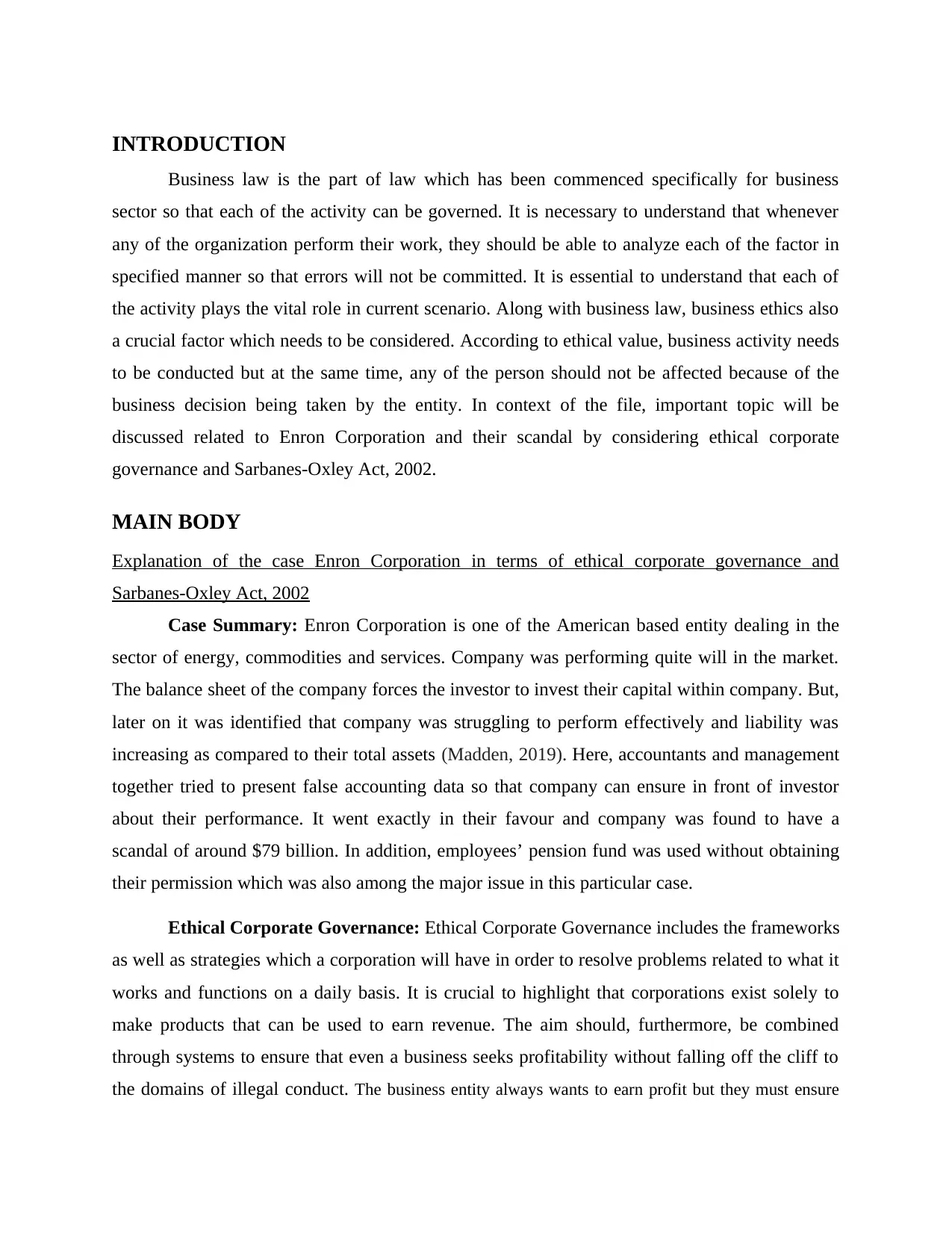
INTRODUCTION
Business law is the part of law which has been commenced specifically for business
sector so that each of the activity can be governed. It is necessary to understand that whenever
any of the organization perform their work, they should be able to analyze each of the factor in
specified manner so that errors will not be committed. It is essential to understand that each of
the activity plays the vital role in current scenario. Along with business law, business ethics also
a crucial factor which needs to be considered. According to ethical value, business activity needs
to be conducted but at the same time, any of the person should not be affected because of the
business decision being taken by the entity. In context of the file, important topic will be
discussed related to Enron Corporation and their scandal by considering ethical corporate
governance and Sarbanes-Oxley Act, 2002.
MAIN BODY
Explanation of the case Enron Corporation in terms of ethical corporate governance and
Sarbanes-Oxley Act, 2002
Case Summary: Enron Corporation is one of the American based entity dealing in the
sector of energy, commodities and services. Company was performing quite will in the market.
The balance sheet of the company forces the investor to invest their capital within company. But,
later on it was identified that company was struggling to perform effectively and liability was
increasing as compared to their total assets (Madden, 2019). Here, accountants and management
together tried to present false accounting data so that company can ensure in front of investor
about their performance. It went exactly in their favour and company was found to have a
scandal of around $79 billion. In addition, employees’ pension fund was used without obtaining
their permission which was also among the major issue in this particular case.
Ethical Corporate Governance: Ethical Corporate Governance includes the frameworks
as well as strategies which a corporation will have in order to resolve problems related to what it
works and functions on a daily basis. It is crucial to highlight that corporations exist solely to
make products that can be used to earn revenue. The aim should, furthermore, be combined
through systems to ensure that even a business seeks profitability without falling off the cliff to
the domains of illegal conduct. The business entity always wants to earn profit but they must ensure
Business law is the part of law which has been commenced specifically for business
sector so that each of the activity can be governed. It is necessary to understand that whenever
any of the organization perform their work, they should be able to analyze each of the factor in
specified manner so that errors will not be committed. It is essential to understand that each of
the activity plays the vital role in current scenario. Along with business law, business ethics also
a crucial factor which needs to be considered. According to ethical value, business activity needs
to be conducted but at the same time, any of the person should not be affected because of the
business decision being taken by the entity. In context of the file, important topic will be
discussed related to Enron Corporation and their scandal by considering ethical corporate
governance and Sarbanes-Oxley Act, 2002.
MAIN BODY
Explanation of the case Enron Corporation in terms of ethical corporate governance and
Sarbanes-Oxley Act, 2002
Case Summary: Enron Corporation is one of the American based entity dealing in the
sector of energy, commodities and services. Company was performing quite will in the market.
The balance sheet of the company forces the investor to invest their capital within company. But,
later on it was identified that company was struggling to perform effectively and liability was
increasing as compared to their total assets (Madden, 2019). Here, accountants and management
together tried to present false accounting data so that company can ensure in front of investor
about their performance. It went exactly in their favour and company was found to have a
scandal of around $79 billion. In addition, employees’ pension fund was used without obtaining
their permission which was also among the major issue in this particular case.
Ethical Corporate Governance: Ethical Corporate Governance includes the frameworks
as well as strategies which a corporation will have in order to resolve problems related to what it
works and functions on a daily basis. It is crucial to highlight that corporations exist solely to
make products that can be used to earn revenue. The aim should, furthermore, be combined
through systems to ensure that even a business seeks profitability without falling off the cliff to
the domains of illegal conduct. The business entity always wants to earn profit but they must ensure
⊘ This is a preview!⊘
Do you want full access?
Subscribe today to unlock all pages.

Trusted by 1+ million students worldwide
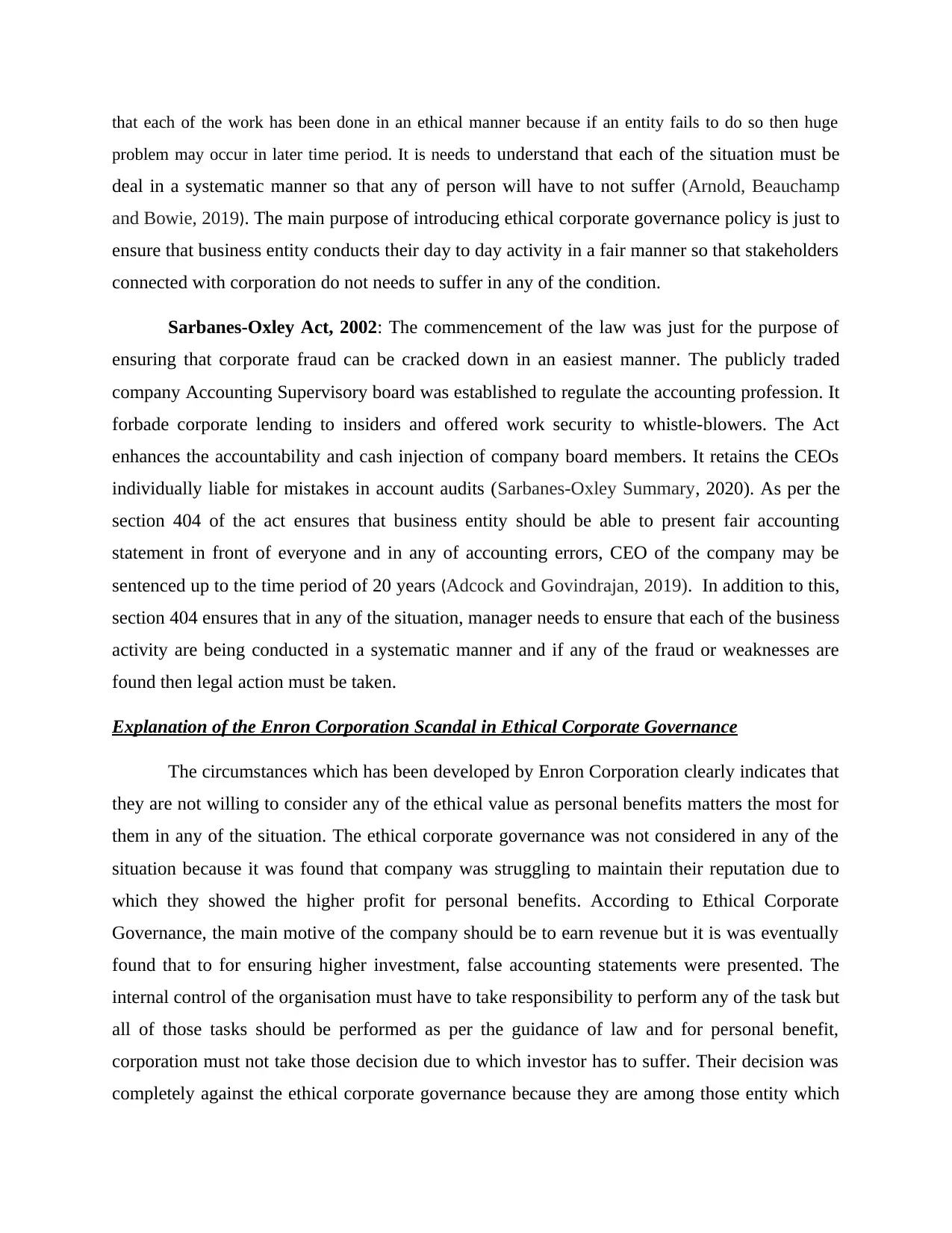
that each of the work has been done in an ethical manner because if an entity fails to do so then huge
problem may occur in later time period. It is needs to understand that each of the situation must be
deal in a systematic manner so that any of person will have to not suffer (Arnold, Beauchamp
and Bowie, 2019). The main purpose of introducing ethical corporate governance policy is just to
ensure that business entity conducts their day to day activity in a fair manner so that stakeholders
connected with corporation do not needs to suffer in any of the condition.
Sarbanes-Oxley Act, 2002: The commencement of the law was just for the purpose of
ensuring that corporate fraud can be cracked down in an easiest manner. The publicly traded
company Accounting Supervisory board was established to regulate the accounting profession. It
forbade corporate lending to insiders and offered work security to whistle-blowers. The Act
enhances the accountability and cash injection of company board members. It retains the CEOs
individually liable for mistakes in account audits (Sarbanes-Oxley Summary, 2020). As per the
section 404 of the act ensures that business entity should be able to present fair accounting
statement in front of everyone and in any of accounting errors, CEO of the company may be
sentenced up to the time period of 20 years (Adcock and Govindrajan, 2019). In addition to this,
section 404 ensures that in any of the situation, manager needs to ensure that each of the business
activity are being conducted in a systematic manner and if any of the fraud or weaknesses are
found then legal action must be taken.
Explanation of the Enron Corporation Scandal in Ethical Corporate Governance
The circumstances which has been developed by Enron Corporation clearly indicates that
they are not willing to consider any of the ethical value as personal benefits matters the most for
them in any of the situation. The ethical corporate governance was not considered in any of the
situation because it was found that company was struggling to maintain their reputation due to
which they showed the higher profit for personal benefits. According to Ethical Corporate
Governance, the main motive of the company should be to earn revenue but it is was eventually
found that to for ensuring higher investment, false accounting statements were presented. The
internal control of the organisation must have to take responsibility to perform any of the task but
all of those tasks should be performed as per the guidance of law and for personal benefit,
corporation must not take those decision due to which investor has to suffer. Their decision was
completely against the ethical corporate governance because they are among those entity which
problem may occur in later time period. It is needs to understand that each of the situation must be
deal in a systematic manner so that any of person will have to not suffer (Arnold, Beauchamp
and Bowie, 2019). The main purpose of introducing ethical corporate governance policy is just to
ensure that business entity conducts their day to day activity in a fair manner so that stakeholders
connected with corporation do not needs to suffer in any of the condition.
Sarbanes-Oxley Act, 2002: The commencement of the law was just for the purpose of
ensuring that corporate fraud can be cracked down in an easiest manner. The publicly traded
company Accounting Supervisory board was established to regulate the accounting profession. It
forbade corporate lending to insiders and offered work security to whistle-blowers. The Act
enhances the accountability and cash injection of company board members. It retains the CEOs
individually liable for mistakes in account audits (Sarbanes-Oxley Summary, 2020). As per the
section 404 of the act ensures that business entity should be able to present fair accounting
statement in front of everyone and in any of accounting errors, CEO of the company may be
sentenced up to the time period of 20 years (Adcock and Govindrajan, 2019). In addition to this,
section 404 ensures that in any of the situation, manager needs to ensure that each of the business
activity are being conducted in a systematic manner and if any of the fraud or weaknesses are
found then legal action must be taken.
Explanation of the Enron Corporation Scandal in Ethical Corporate Governance
The circumstances which has been developed by Enron Corporation clearly indicates that
they are not willing to consider any of the ethical value as personal benefits matters the most for
them in any of the situation. The ethical corporate governance was not considered in any of the
situation because it was found that company was struggling to maintain their reputation due to
which they showed the higher profit for personal benefits. According to Ethical Corporate
Governance, the main motive of the company should be to earn revenue but it is was eventually
found that to for ensuring higher investment, false accounting statements were presented. The
internal control of the organisation must have to take responsibility to perform any of the task but
all of those tasks should be performed as per the guidance of law and for personal benefit,
corporation must not take those decision due to which investor has to suffer. Their decision was
completely against the ethical corporate governance because they are among those entity which
Paraphrase This Document
Need a fresh take? Get an instant paraphrase of this document with our AI Paraphraser
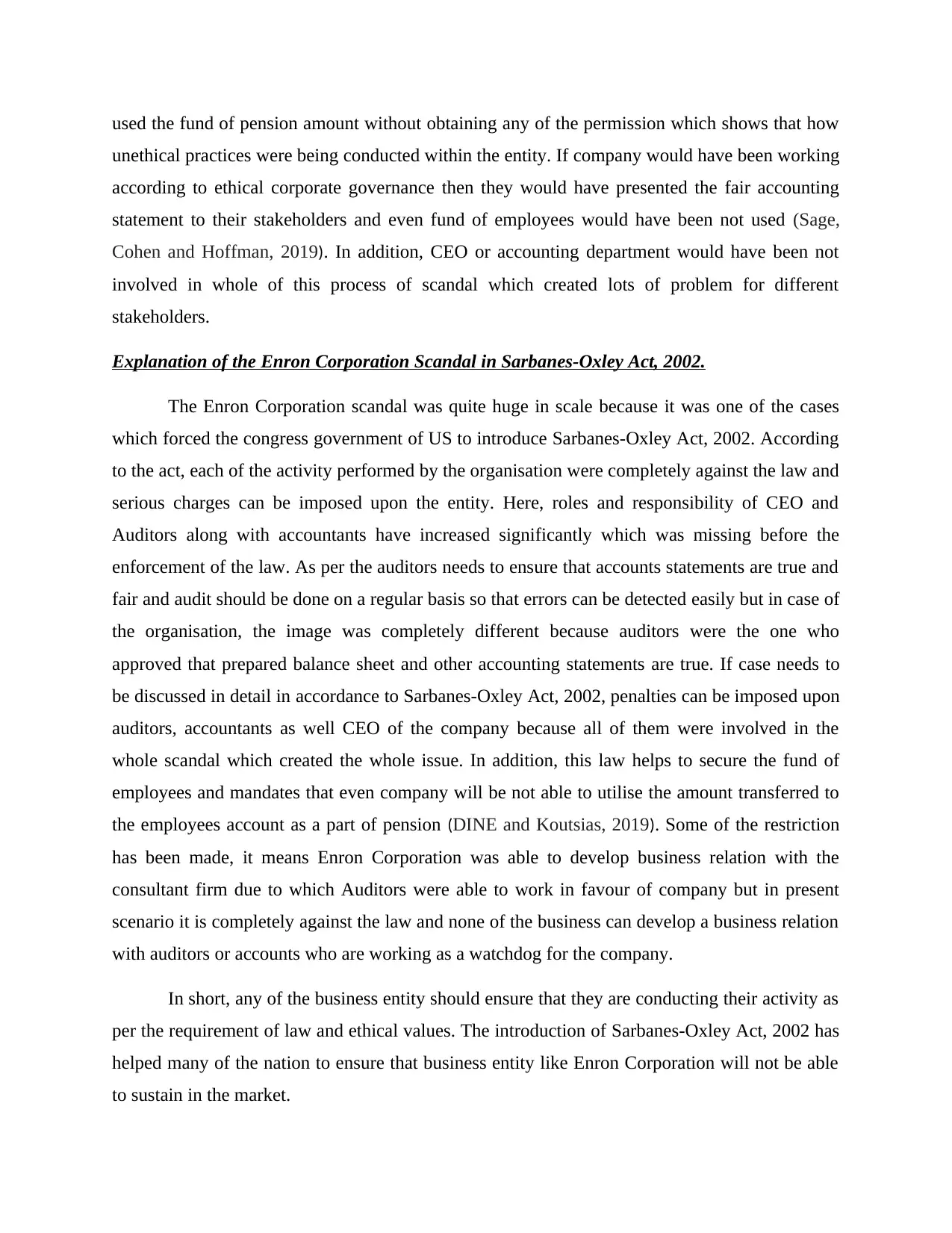
used the fund of pension amount without obtaining any of the permission which shows that how
unethical practices were being conducted within the entity. If company would have been working
according to ethical corporate governance then they would have presented the fair accounting
statement to their stakeholders and even fund of employees would have been not used (Sage,
Cohen and Hoffman, 2019). In addition, CEO or accounting department would have been not
involved in whole of this process of scandal which created lots of problem for different
stakeholders.
Explanation of the Enron Corporation Scandal in Sarbanes-Oxley Act, 2002.
The Enron Corporation scandal was quite huge in scale because it was one of the cases
which forced the congress government of US to introduce Sarbanes-Oxley Act, 2002. According
to the act, each of the activity performed by the organisation were completely against the law and
serious charges can be imposed upon the entity. Here, roles and responsibility of CEO and
Auditors along with accountants have increased significantly which was missing before the
enforcement of the law. As per the auditors needs to ensure that accounts statements are true and
fair and audit should be done on a regular basis so that errors can be detected easily but in case of
the organisation, the image was completely different because auditors were the one who
approved that prepared balance sheet and other accounting statements are true. If case needs to
be discussed in detail in accordance to Sarbanes-Oxley Act, 2002, penalties can be imposed upon
auditors, accountants as well CEO of the company because all of them were involved in the
whole scandal which created the whole issue. In addition, this law helps to secure the fund of
employees and mandates that even company will be not able to utilise the amount transferred to
the employees account as a part of pension (DINE and Koutsias, 2019). Some of the restriction
has been made, it means Enron Corporation was able to develop business relation with the
consultant firm due to which Auditors were able to work in favour of company but in present
scenario it is completely against the law and none of the business can develop a business relation
with auditors or accounts who are working as a watchdog for the company.
In short, any of the business entity should ensure that they are conducting their activity as
per the requirement of law and ethical values. The introduction of Sarbanes-Oxley Act, 2002 has
helped many of the nation to ensure that business entity like Enron Corporation will not be able
to sustain in the market.
unethical practices were being conducted within the entity. If company would have been working
according to ethical corporate governance then they would have presented the fair accounting
statement to their stakeholders and even fund of employees would have been not used (Sage,
Cohen and Hoffman, 2019). In addition, CEO or accounting department would have been not
involved in whole of this process of scandal which created lots of problem for different
stakeholders.
Explanation of the Enron Corporation Scandal in Sarbanes-Oxley Act, 2002.
The Enron Corporation scandal was quite huge in scale because it was one of the cases
which forced the congress government of US to introduce Sarbanes-Oxley Act, 2002. According
to the act, each of the activity performed by the organisation were completely against the law and
serious charges can be imposed upon the entity. Here, roles and responsibility of CEO and
Auditors along with accountants have increased significantly which was missing before the
enforcement of the law. As per the auditors needs to ensure that accounts statements are true and
fair and audit should be done on a regular basis so that errors can be detected easily but in case of
the organisation, the image was completely different because auditors were the one who
approved that prepared balance sheet and other accounting statements are true. If case needs to
be discussed in detail in accordance to Sarbanes-Oxley Act, 2002, penalties can be imposed upon
auditors, accountants as well CEO of the company because all of them were involved in the
whole scandal which created the whole issue. In addition, this law helps to secure the fund of
employees and mandates that even company will be not able to utilise the amount transferred to
the employees account as a part of pension (DINE and Koutsias, 2019). Some of the restriction
has been made, it means Enron Corporation was able to develop business relation with the
consultant firm due to which Auditors were able to work in favour of company but in present
scenario it is completely against the law and none of the business can develop a business relation
with auditors or accounts who are working as a watchdog for the company.
In short, any of the business entity should ensure that they are conducting their activity as
per the requirement of law and ethical values. The introduction of Sarbanes-Oxley Act, 2002 has
helped many of the nation to ensure that business entity like Enron Corporation will not be able
to sustain in the market.
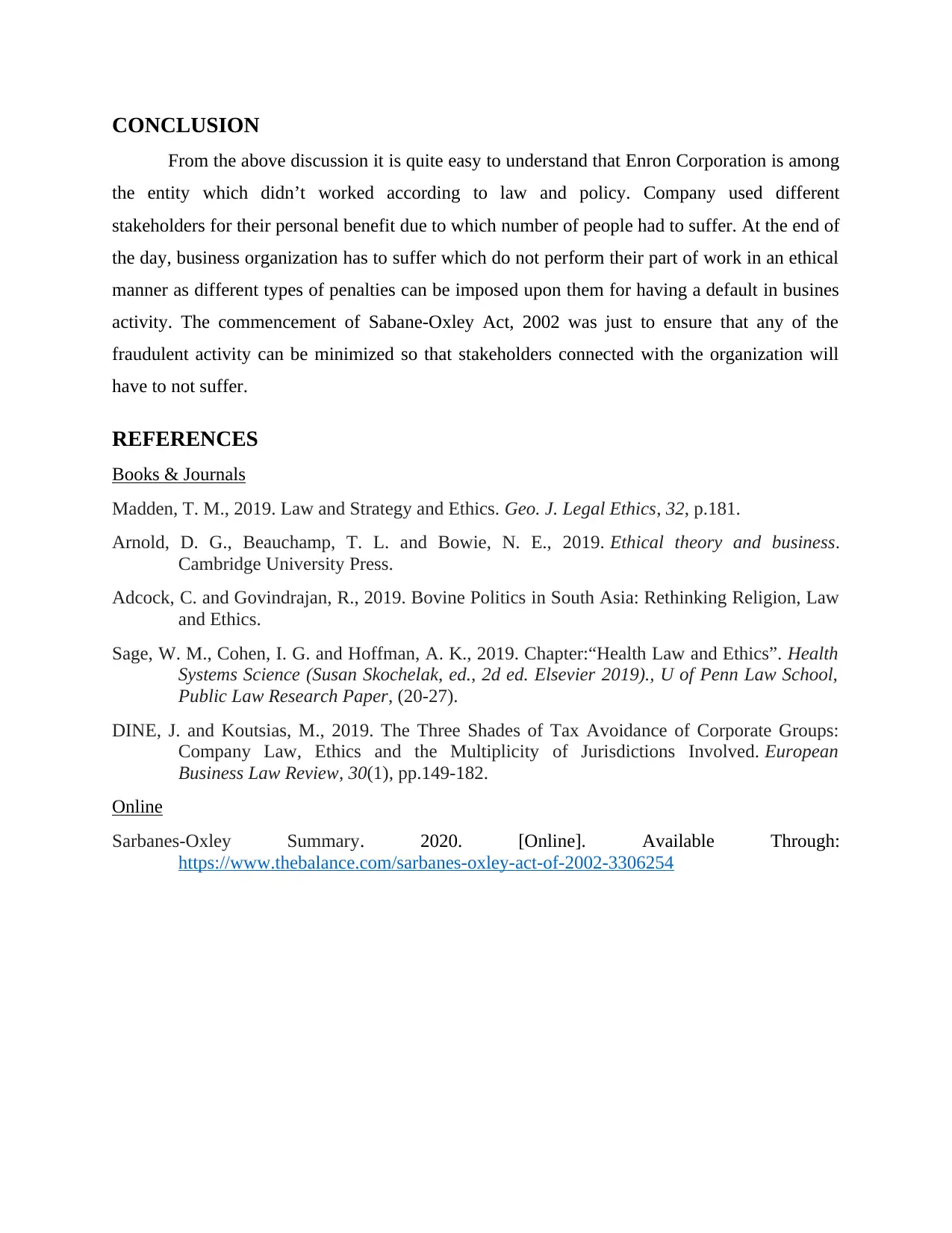
CONCLUSION
From the above discussion it is quite easy to understand that Enron Corporation is among
the entity which didn’t worked according to law and policy. Company used different
stakeholders for their personal benefit due to which number of people had to suffer. At the end of
the day, business organization has to suffer which do not perform their part of work in an ethical
manner as different types of penalties can be imposed upon them for having a default in busines
activity. The commencement of Sabane-Oxley Act, 2002 was just to ensure that any of the
fraudulent activity can be minimized so that stakeholders connected with the organization will
have to not suffer.
REFERENCES
Books & Journals
Madden, T. M., 2019. Law and Strategy and Ethics. Geo. J. Legal Ethics, 32, p.181.
Arnold, D. G., Beauchamp, T. L. and Bowie, N. E., 2019. Ethical theory and business.
Cambridge University Press.
Adcock, C. and Govindrajan, R., 2019. Bovine Politics in South Asia: Rethinking Religion, Law
and Ethics.
Sage, W. M., Cohen, I. G. and Hoffman, A. K., 2019. Chapter:“Health Law and Ethics”. Health
Systems Science (Susan Skochelak, ed., 2d ed. Elsevier 2019)., U of Penn Law School,
Public Law Research Paper, (20-27).
DINE, J. and Koutsias, M., 2019. The Three Shades of Tax Avoidance of Corporate Groups:
Company Law, Ethics and the Multiplicity of Jurisdictions Involved. European
Business Law Review, 30(1), pp.149-182.
Online
Sarbanes-Oxley Summary. 2020. [Online]. Available Through:
https://www.thebalance.com/sarbanes-oxley-act-of-2002-3306254
From the above discussion it is quite easy to understand that Enron Corporation is among
the entity which didn’t worked according to law and policy. Company used different
stakeholders for their personal benefit due to which number of people had to suffer. At the end of
the day, business organization has to suffer which do not perform their part of work in an ethical
manner as different types of penalties can be imposed upon them for having a default in busines
activity. The commencement of Sabane-Oxley Act, 2002 was just to ensure that any of the
fraudulent activity can be minimized so that stakeholders connected with the organization will
have to not suffer.
REFERENCES
Books & Journals
Madden, T. M., 2019. Law and Strategy and Ethics. Geo. J. Legal Ethics, 32, p.181.
Arnold, D. G., Beauchamp, T. L. and Bowie, N. E., 2019. Ethical theory and business.
Cambridge University Press.
Adcock, C. and Govindrajan, R., 2019. Bovine Politics in South Asia: Rethinking Religion, Law
and Ethics.
Sage, W. M., Cohen, I. G. and Hoffman, A. K., 2019. Chapter:“Health Law and Ethics”. Health
Systems Science (Susan Skochelak, ed., 2d ed. Elsevier 2019)., U of Penn Law School,
Public Law Research Paper, (20-27).
DINE, J. and Koutsias, M., 2019. The Three Shades of Tax Avoidance of Corporate Groups:
Company Law, Ethics and the Multiplicity of Jurisdictions Involved. European
Business Law Review, 30(1), pp.149-182.
Online
Sarbanes-Oxley Summary. 2020. [Online]. Available Through:
https://www.thebalance.com/sarbanes-oxley-act-of-2002-3306254
⊘ This is a preview!⊘
Do you want full access?
Subscribe today to unlock all pages.

Trusted by 1+ million students worldwide
1 out of 6
Related Documents
Your All-in-One AI-Powered Toolkit for Academic Success.
+13062052269
info@desklib.com
Available 24*7 on WhatsApp / Email
![[object Object]](/_next/static/media/star-bottom.7253800d.svg)
Unlock your academic potential
Copyright © 2020–2025 A2Z Services. All Rights Reserved. Developed and managed by ZUCOL.





